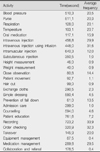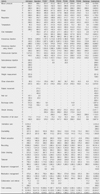Abstract
Purpose
The purpose of this study was to compare the cost using different methods of costing nursing activities for patients with chronic otitis media having surgery.
Method
Data were collected from 30 patients who had mastoidectomy and tympanoplasty. To compare the cost, the researchers used three different costing methods; consumed time, resource based relative value scale (RBRVS), and critical pathway (CP).
Results
Twenty-six nursing activities for surgical patients with chronic otitis media were found. Total cost was 83,843.7 won using RBRVS. The costliest activity was recording at 9,734.4 won, followed by confirmation of doctors' orders at 9,302.4 won, and injection with infusion pump at 9,072.0 won. There was a difference in nursing activities performed according to the length of hospital stay, and the cost was highest on the surgery day at 13,417.8 won. Comparatively, the total cost was 72,014.4 won using CP.
Conclusions
Nursing activities are performed in various forms according to the disease and patient's condition, and different nursing activities are executed according to the length of hospital stay. In order to measure the load of nursing activities and distribute it appropriately, it is necessary to analyze the cost of nursing activities by the process of nursing services performed.
Figures and Tables
References
1. Ahn HY. Clinical otolaryngology head and neck surgery. 2005. Seoul: Koonja Publishing.
2. Jeong S. Development of critical pathway for patients with lobectomy and pneumonectomy. 2003. Seoul: Yonsei University;Unpublished master's thesis.
3. Kim IS, Kang KH, Lee HJ, Kim MJ, Kang SJ, Joo YM. Cost analysis of nursing services in the delivery room using activity-based costing. J Korean Acad Nurs Adm. 2002. 8(1):17–29.
4. Kim MS, Lee HJ, Kim YH, Kim JS. Nursing cost in operating room applying the resource-based relative value scale (RBRVS). J Korean Acad Nurs Adm. 2002. 8(2):283–293.
5. Lee SJ. Cost analysis of home care with activity-based costing. J Korean Acad Nurs. 2004. 34(6):1117–1128.

6. Lee TW, Park JS, Kim IS. Workload measurement of home health care nurse's services using relative value units. J Korean Acad Nurs. 2000. 30(6):1543–1555.

7. Lim JY. An analysis of cost and profit of a nursing unit using performance-based costing: case of a general surgical ward in a general hospital. J Korean Acad Nurs. 2008. 38(1):161–171.

8. Lim JY, Yoo SW. The trends of cost analysis on nursing services. J Korean Acad Nurs Adm. 2007. 13(4):407–420.
9. Moinuddin K, Collins T, Bansal A. Process activity mapping-Activity-based costing for semiconductor enterprises. Cost Manag. 2007. 21(2):29–33.
10. Moon SY. Resource-based relative value for estimation of nursing behavior in neonatal intensive care units. Korean J Child Health Nurs. 2006. 12(1):15–24.
11. Park JH, Song MS, Sung YH, Ham ML, Yun SO. Estimation of nursing costs for hospitalized patients based on the KDRG classification. J Korean Acad Nurs Adm. 1997. 3(2):151–165.
12. Park JH, Song MS, Sung YH, Cho JS, Sim WH. Estimation of nursing costs for hospitalized patients using the resource-based relative value scale. 1998. Seoul: Korean Nurses Association.
13. Park YA. A development of a critical pathway of mastoidectomy and tympanoplasty. 2007. Incheon: Inha University of Korea;Unpublished master's thesis.
14. Watanabe S, Kaneda S. Workflow analysis method using activity-based costing management with information allocation. Electron Commun Jpn. 2004. 87(8):55–65.

15. Zander K. Nursing case management: Resolving the DRG paradox. Nurs Clin North Am. 1988. 23(3):503–520.




 PDF
PDF ePub
ePub Citation
Citation Print
Print




 XML Download
XML Download